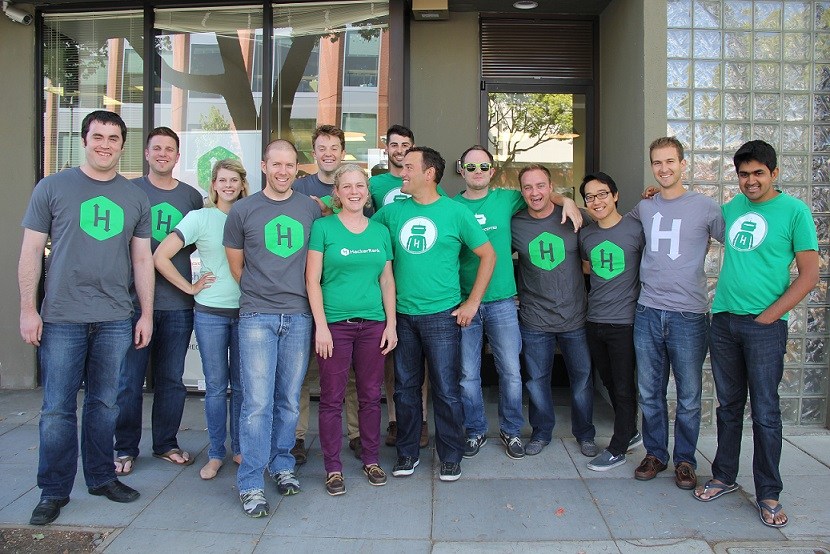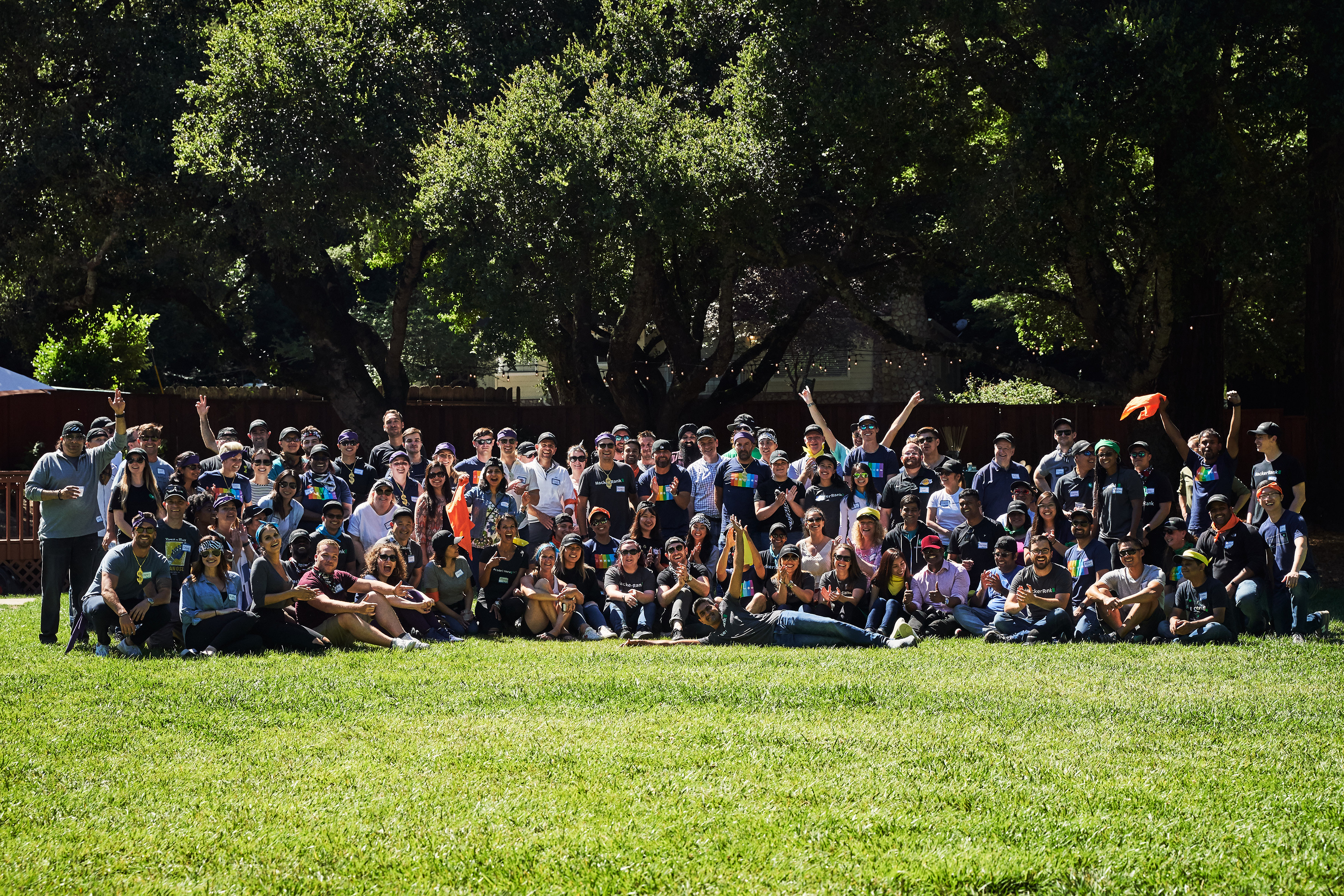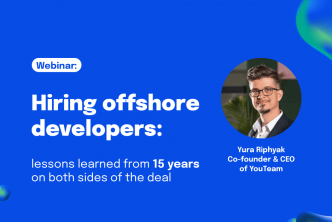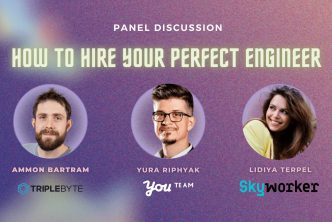Interview with Vivek Ravisankar, CEO at HackerRank

Founded in 2012 in Bangalore, India, HackerRank has reinvented the recruitment process. Having started as a website that matched mentors with students, today HackerRank is a leading tech skills assessment platform for software developers. Their core mission is to match every developer to the right job, based on skills and not on factors like where candidates went to school and where they worked before.
In his interview with YouTeam’s CPO and co-founder Yurij Riphyak, Vivek Ravisankar, CEO of HackerRank, tells the company story, explains how HackerRank tests work, and talks about the insights he gained after the assessment of close to 6 million. Vivek also shares his opinion on the future of remote work.
Yurij: Today, HackerRank is already a big company but imagine that you’re at the pre-seed stage again. How would you describe what HackerRank does, what problem does it solve and for whom?
Vivek: I think the mission of the company has been consistent right from the beginning to where we are now, which is being able to match every developer with the right job, the underlying driver being skill over pedigree. It shouldn’t matter what school you went to or which company you worked at before. What matters is do you have the skills to do the job or not? That’s the underlying mission.
We started off with a product that can help you assess candidates when you’re going onsite to campuses and university events because it’s very hard to distinguish resumes from university students, and everybody from a small series A company all the way to Google only visit like 20 or 30 schools. There are more than 500 schools that teach CS programs. So we started off with a niche for assessing new university grads. Since then it has evolved beyond that. We assess different levels of seniority, in different parts of the workflow, even in the interview process, like sourcing, assessment of interviewing. We’ve grown a lot.
Yurij: At which moment did you realize that this was going to become big?
Vivek: Every day I want HackerRank to get bigger, so there was no particular moment when I realized it was big. I’ll rephrase the question to “When did you get the product-market fit?”. It happened when I saw requests from a lot of tech companies known for having a high bar when hiring engineers. They started to call and say, “Hey, we want to use your product for hiring engineers”. So that was the first phase of finding the product-market fit. The second phase was reaching out to new industries. We went beyond Silicon Valley. It was proven by the fact that industries like financial services, retail, automotive were all starting to use our product because every company is going through the massive transformation of becoming a software company. On every stage of growth of the company, you will have to think about what does it take to go to the next stage, both from the product perspective and the go-to-market perspective. It’s always going to be that game that we play, and we’ve got to decide now what does it take to get to the next bigger milestone, with a different kind of muscle.

Yurij: This formula that you’ve mentioned – skills over pedigree – it’s about signaling, right? Signaling the quality of a particular talent, how much value they can add right in the workplace. In your opinion, what defines this kind of quality when we’re talking about the talent? What is quality if applied to a talent for you?
Vivek: I think that if you’re focused on looking at the top 10 schools from which a person graduates or at the top 50 companies they were employed at, by definition, you’re looking at a minority section of the population. Maybe it’s 5 percent or maybe it’s even 20 percent. What about the remaining 80 percent? Being able to equalize the playing field for everyone where skill comes first over anything else just opens up your talent pool in general.
A lot of our customers have been able to hire people that they probably would have rejected if you were just looking at their resumes. For example, a candidate who was a dishwasher ended up joining this company as a developer because he scored really well on his HackerRank tests. He ended up getting promoted twice. This example shows that we’re able to open up talent pools to a much larger degree than before.
Yurij: I see, so it enables those guys who haven’t graduated as computer science graduates from top universities?
Vivek: Yes, and software developers who you wouldn’t probably reach out to because you don’t think that a certain company actually has that many developers. There’s so much hidden potential, and that’s a majority. You’re actually not reaching out to the majority. The supply shortage is a myth. The real thing is that the supply the people are actually looking at is very small and concentrated. As a result, the demand and prices grow, bringing up a question if you’re able to equalize the opportunities on the playing field for everyone.
Yurij: From our own experience – when we’re looking at a typical HackerRank test, it’s not that much about going very hardcore in the actual coding, but it’s more about general problem-solving skills. Can we dig a little bit into this part? What kind of philosophy do you use to develop this actual test framework?
Vivek: Yes, sure. I think there’s a lot of different parameters, but the core is the seniority of the candidates. For example, a new grad, a mid-level, a senior, or a principal engineer. For each of these roles, you need to think about the questions that you need to assess and the assessment duration. Plus, what is the positioning of the interview process that you need to do? For example, for a new grad, the type of assessment would be an algorithm or problem-solving skills, because it’s the most common denominator, and people get used to it. The duration that you give them is 60 to 120 minutes, and if this candidate receives a good score, you can bring them in for an on-site interview. You’re hiring for potential, not experience because this person is a new grad.
Now if you’re looking to hire, say, a mid-level engineer, with 3 or 4 years of work experience, then you’ll be looking both for potential and past experience. For hiring a front-end developer, you would actually have a different kind of assessment, which might have a little bit of basic problem-solving skills, but more weighted towards, “Is the candidate able to debug this React app?”, and the duration would be much more relaxed. It’s not going to take the candidate two days, it might certainly take them only an hour or two, but you’ll give them two days because they’re probably busy, they’re working at a company, and you don’t want them to feel under pressure.
Then, there are other things that you care about, such as how the code looks, the code style, etc., so the process is going to be very different. You’re going to continue the interview process and ask the candidate to walk through their code and explain why they chose this particular design pattern over something else. Or, if this was a problem, how would they approach it differently. For each of these different seniorities, there is a type of assessment that has a duration and there’s a workflow component.

Yurij: So, in your own opinion, supported by the experience of testing over 5 million developers, what makes a great engineer? What separates really outstanding engineers from the majority?
Vivek: I don’t think there’s an outstanding engineer. I think there’s an engineer-to-company fit. I don’t think there’s a global outstanding engineer, because the principles of engineering vary a lot. I’m going to give you a very basic example: a consumer app. Consumer app developers probably use the “move fast and break things” kind of approach, which is that, “I’m going to ship every day, there’s going to be hundreds of A/B tests I’m going to run, some of them will work, some of them will not work, some of them will be buggy.” If you’re an enterprise product developer, you cannot afford to be operating under the “move fast and break things” approach. There are large companies probably paying millions of dollars, and they will get very upset if things go haywire. It doesn’t mean that engineers working at consumer companies are “buggier” than at enterprise, but there are different operating principles and philosophies.
As a result, an engineer who really enjoys and thrives in this kind of A/B test running environments will not be a good fit for a large enterprise organization, and vice versa. An enterprise organization is probably slower, but the impact is real. You know the pain point that you’re trying to solve for a customer, you’re actually fixing it, and you can actually see it deployed across lots and lots of customers. You can actually see your sales team jumping with joy, coming and telling you about the things that you’re actually shipping. But you’ll never get all those kinds of things in other types of company. So that kind of fit is what you need to think about. It’s like a loose common denominator for making sure that you’re a good engineer regardless of which company you’re in. It’s more important to find a good fit for your team and your company versus a global ranking.
Yurij: Any other insights after testing 5 million developers?
Vivek: There are lots, and it varies tremendously across new grads to senior folks, from geography and others. One of the most interesting trends that we’re starting to see while researching is understanding more about Gen Z. If you thought that managing millennials was hard, then welcome to managing Gen Z. The amount of value that they place on the career growth and flexible work versus compensation is so different compared to the previous generation.
They all want to have a good understanding of how fast they want to grow and how flexible their work environment is. People want to grow faster and that is good. The thing that I think people miss is – you have to put in the work to get the rewards.
Yurij: Does the preference for flexibility mean that they prefer to work remotely or is it just a flexible schedule?
Vivek: It’s a combination of flexible work hours and remote and things along those lines.
Yurij: Here is one thing I noticed: HackerRank does university rankings, but you do this internationally, not just the United States. Why does it make sense for you in the first place to invest in the international university rankings?
Vivek: We want to share that we analyzed millions of student interviews that happened on our platform. It means that millions of students have taken assessments and interviews from different companies and have been ranked by different skills, and what skills the companies actually want. Then we decided – okay, let’s actually align universities based on skills that they have. So here are the skills that companies look for in the new grads, now let’s look which college has the highest concentration of quality skills.
It’s pretty revealing that the top 5 schools in North America had only one Ivy League. Statistically, we had a good sample size, so it’s not like we had two people from Stanford and 15,000 from some other university. But this is going to fundamentally change the way you think about the university recruiting, which emphasizes the point that the talent is everywhere but the opportunity is not. So that’s the reason for “why international.”

Yurij: This overall trend with remote work — more and more companies are hiring remotely. We have successful companies with over a billion valuation like GitLab that are 100% remote, there is no office at all. What do you think about this? Is it like a temporary thing or is it going to stay and develop? What is the HackerRank role in this trend?
Vivek: It’s an interesting question. If you want to go remote, you will have to do it from the very beginning. You cannot try to change after a certain point in time because there is a lot of core communication infrastructure. But more importantly, I think, communication is the biggest challenge of remote work. For example, every meeting is recorded at GitLab. Someone has called for a meeting so you have to record it and put it up. You have to send notes on the meeting to the entire company. So you cannot change that, you have to do it right at the beginning. You have to make sure that the people you are hiring are initially onboarded to this kind of concept.
It’s hard to say if more and more companies are going to start working remotely because I believe that the speed of iteration dramatically slows down. I do think that more companies will be open to either having a core in Silicon Valley and opening an office somewhere else. That is one trend you’re going to see very soon.
Yurij: Like a milder transition towards a distributed structure.
Vivek: Correct. So maybe after your first 20 engineers, you may think – hey, I can’t pay this high salary any longer, so I’m going to open somewhere else. You can actually do it, but first, the core of the team still needs to be together. I also think there are going to be more tools to support the remote infrastructure. Now people are using Zoom, Slack and a combination of them, but I do think there’s a lot more opportunity for us to innovate in that space. And this can enable either starting a remote company off the ground or, once you have a decent size, you may want to open up another office or a distributed one. One of our customers had a giant wall in the office cafeteria, which had the video of the other office, it almost felt like you were sitting in front of this person. You were in New York, but you were looking at something that was happening in Atlanta. That’s a small thing, but there could be more innovation on core infrastructure that will make it feel like you’re all closer together even if you’re remote. That’s just one example, but I’m pretty sure there’ll be more tools to help you with that.
Yurij: Got it. The last one from me: let’s imagine you’re not busy with HackerRank, and you have time to do something else. What kind of idea would that be? What would be the next thing you would work on?
Vivek: There are two things, and they’re completely opposite. Either I would go back to India and make movies – it has to be from the native perspective — otherwise, people cannot relate to it. If it’s going to be like a company, I’ve always wanted to try an idea of an operating system for a company. Most companies, including us, find it very hard to really connect the dots across the different sections that you build, and you end up creating a lot of silos. For example, we have a marketing campaign that’s translated to a specific level of leads, engagement at the sales process, and closed deals. We have customers that are actually using the product, and then we decide to double down on this campaign. Here is where it’s broken, and usually there are around 15 different systems. That’s why I’m calling this like an operating system for the company.
Yurij: Is this some kind of business process automation?
Vivek: Right. Every activity that the company does is mapped to the end result, and you know where you want to double down on the efforts. For example, if we hired three engineers, we would immediately know where and why they’d need to double down on You can start small. It’s the operating system for the entire company, which means it’ll be super sticky because it is your core operating module. So you’ll be talking to the CEOs, you’ll be making a budget to buy these products. I can now see literally everything — recruiting, customer retention, new logo, and I know – hey, this is what we need to double down on and this is where we need to stop. I feel like this kind of tool can dramatically accelerate your business.
Yurij: Thanks for the explanation, that was my last question. Thank you very much for a great interview!
This interview is just a tiny part of our huge project – a series of founder stories shared by YouTeam. Enjoy your reading and keep coming back for more opinions from the world’s most successful tech founders.





